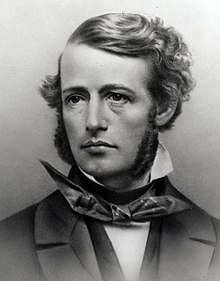Alexander Wells (California)
Alexander Wells (October 7, 1819 – October 31, 1854) was an Associate Justice of the Supreme Court of California.
Alexander Wells | |
|---|---|
 | |
| Associate Justice of the California Supreme Court | |
| In office January 3, 1853 – October 31, 1854 | |
| Preceded by | Alexander O. Anderson |
| Succeeded by | Charles Henry Bryan |
| Member of the New York State Assembly for New York Co. | |
| In office January 1, 1846 – December 31, 1846 | |
| Personal details | |
| Born | October 7, 1819 New York City, New York, U.S. |
| Died | October 31, 1854 (aged 35) San Jose, California, U.S. |
| Spouse(s) | Annie Van Rensselaer Van Wyck
( m. 1846; |
Early life
Wells was born on October 7, 1819 in New York City.[1]
Career
He was admitted to the bar about 1842, and practiced law in New York City. He also entered politics as a Democrat, and was a member of the New York State Assembly in 1846.[2]
About 1850, they moved to California and on April 1852, he was appointed a temporary Associate Justice of the California Supreme Court, to serve during the absence of Justice Solomon Heydenfeldt, and remained on the bench until October.[3]
He won the Democratic nomination for a seat as Associate Justice of the Supreme Court of California in 1852, defeating the incumbent Alexander O. Anderson who had been appointed to the vacancy caused by the resignation of Henry A. Lyons. On November 2, 1852, Wells was elected for the remainder of the term, which expired at the end of 1854.[4] He was to be re-elected in 1854 for a full term,[5] but died shortly thereafter. One historian summed up his judicial career as follows: "The sixth associate justice, Alexander Wells, who came to the bench in 1853 at the age of 59, [sic] died a year later, leaving no published legal mark on the court".[6]
Personal life
On October 7, 1846, he married Annie Van Rensselaer Van Wyck (1822–1919),[7][8] the daughter of Philip Gilbert Van Wyck (1786–1870) and Mary Smith (née Gardiner) Van Wyck (1788–1858). Her paternal grandparents were Catherine Van Cortlandt (1751–1829) and Abraham Van Wyck (1748–1786) and her uncles were Pierre Van Cortlandt Van Wyck and David Gardiner.[7] Wells was introduced to Annie by her cousin, Stephen Van Rensselaer.[7] Together they had:
- Ann Van Cortlandt Wells (1848–1848), who died young.
- Gertrude Van Cortlandt Wells (1849–1944), who married Schuyler Hamilton, Jr. (1853–1907), the son of Schuyler Hamilton and grandson of Alexander Hamilton, in 1877.[9] Before their divorce in 1884, they had three children.[10] In 1901, she married the Baron Raoul Nicholas de Graffenried.[11] He was the son of Baron Emanuel de Graffenried, Ambassador from Switzerland to Austria, and his wife, Baroness Gabrielle de Barco, lady-in-waiting to the Empress of Austria, assassinated at Geneva, while traveling the Swiss Alps. They divorced in 1908.[12]
- Grady Wells (1852–1854), who died young.
Wells died suddenly on October 31, 1854, at his home in San Jose, California.[13][14] In 1903, his widow inherited the estate of her sister, Joanna L. Van Wyck, estimated at several million dollars.[15]
References
- Richard Roy Powell, Compromises of Conflicting Claims: A Century of California Law, 1760 to 1860 (1977), p. 227.
- Hough, A.M., M.D., Franklin B. (1858). The New York Civil List: Containing the Names and Origin of the Civil Divisions, and the Names and Dates of Election or Appointment of the Principal State and County Officers from the Revolution to the Present Time. Albany: Weed, Parsons and Co., Publishers. Retrieved 25 July 2017.CS1 maint: multiple names: authors list (link)
- Alexander Wells in Journal of the State Bar of California (1946; Vol. 21–22; pg. 225)
- Secrest, William B. (2004). Dark and Tangled Threads of Crime: San Francisco's Famous Police Detective Isaiah W. Lees. Quill Driver Books. p. 44. ISBN 9781884995415. Retrieved 25 July 2017.
- The State Register and Year Book of Facts (1859; pg. 192)
- Servants of the Law by Donald R. Burrill (2011), p. 65. (In fact, Wells was about 31, not 59, when he took office)
- The American Monthly Magazine (Vol. 3; 1893; pg. 686)
- "Obituary -- WELLS". The New York Times. 8 May 1919. Retrieved 25 July 2017.
- Times, Special To The New York (14 February 1907). "DEATH LIST OF A DAY. | Schuyler Hamilton". The New York Times. Retrieved 25 July 2017.
- "MRS. S. HAMILTON, JR., DEAD.; Took an Overdose of Morphine at Her Home in the Florence -- Prostrated by the Storm". The New York Times. 4 May 1899. Retrieved 25 July 2017.
- "DEATH LIST OF A DAY". The New York Times. Retrieved 17 October 2016.
- "Rites Tomorrow for Baroness, 94 | Former Gertrude Wells Was Talented Musician". Brooklyn Eagle. January 28, 1944.
- History of the Supreme Court justices of California by J. Edward Johnson (1963; pg. 1831)
- Legislature, California (1855). Journals of the Legislature of the State of California. Retrieved 25 July 2017.
- "LEFT SEVERAL MILLIONS.; Will of Joanna Van Wyck of Ossining Filed for Probate". The New York Times. 29 August 1903. Retrieved 25 July 2017.
External links
- Portrait of Alexander Wells at the California Supreme Court Historical Society
- Past & Present Justices. California State Courts. Retrieved July 19, 2017.
| Legal offices | ||
|---|---|---|
| Preceded by Alexander O. Anderson |
Associate Justice of the California Supreme Court 1853–1854 |
Succeeded by Charles Henry Bryan |